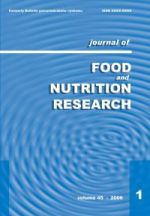Vedecký časopis - archív
Journal of Food and Nutrition Research
Online First Articles
Sitkey, V. – Dočolomanský, P. – Čičová, I. – Čuchorová, J. – Puchľová, E. – Belajová, E.
Screening carrot varieties for biocatalytic reduction of acetophenone to
Vladimír Sitkey, Axxence Slovakia s.r.o., Mickiewiczova 9, 81107 Bratislava, Slovakia. E-mail: vladimir.sitkey@axxence.sk
Original article
Received 2 October 2023; 1st revised 6 November 2023; accepted 9 November 2023; published online
Súhrn: Many aroma-active compounds can be produced by means of plant-mediated reactions. Biotransformation using whole plant cells is a field of green chemistry, whose purpose is to minimize the impact on the environment in combination with the advantages of high chemo-, regio- and stereoselectivity. One such example is the asymmetric reduction of corresponding prochiral ketones to chiral alcohols. In this work, twenty-one different carrot varieties were screened as a whole-cell biocatalyst for bioreduction of acetophenone to 1-phenylethanol, an important aroma compound. The reaction catalysed by grated carrot roots was carried out in an orbital shaker, under controlled conditions (30 °C, 2.83 Hz, 24 h). The substrate and product concentrations were analysed during the reaction by gas chromatography. All tested carrot varieties showed interesting biocatalytic activity, with substrate conversion degree in the range of 55.1–85.0 %. When using Tendersweet variety, which showed the highest biocatalytic activity, the enantiomeric excess of (S)-1-phenylethanol reached 86.4 %. The influence of sugar content in carrot roots on enzyme activity was not confirmed. The results provide useful information on the application of carrot roots as a promising source for the biocatalytic conversion of acetophenone to 1-phenylethanol.
Kľúčové slová: 1-phenylethanol; acetophenone; carrot root; chiral alcohol; sugar; whole-cell biocatalysis
Na stiahnutie:
jfnr-2024-1-pp091-100-sitkey.pdf (PDF, 488.4 Kb, 369x)










